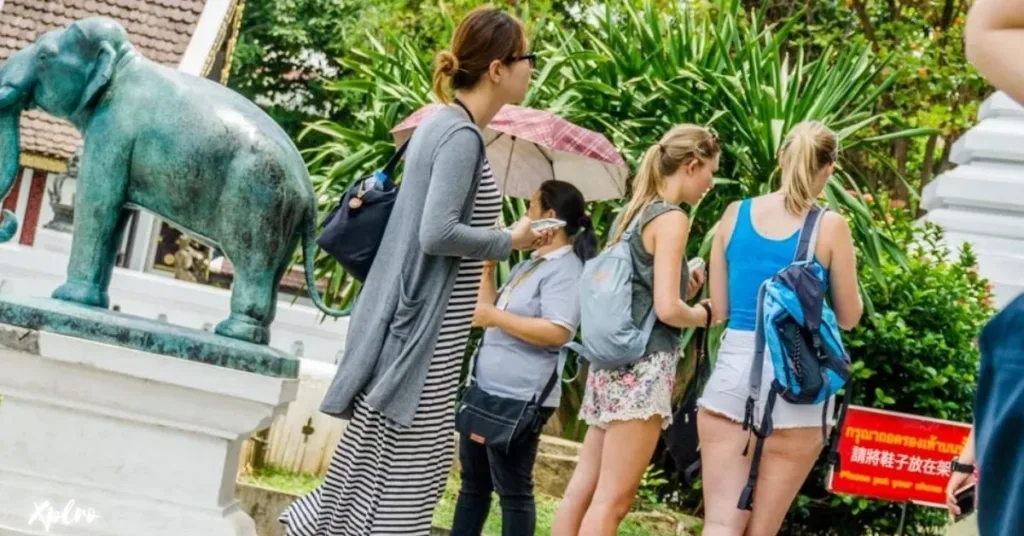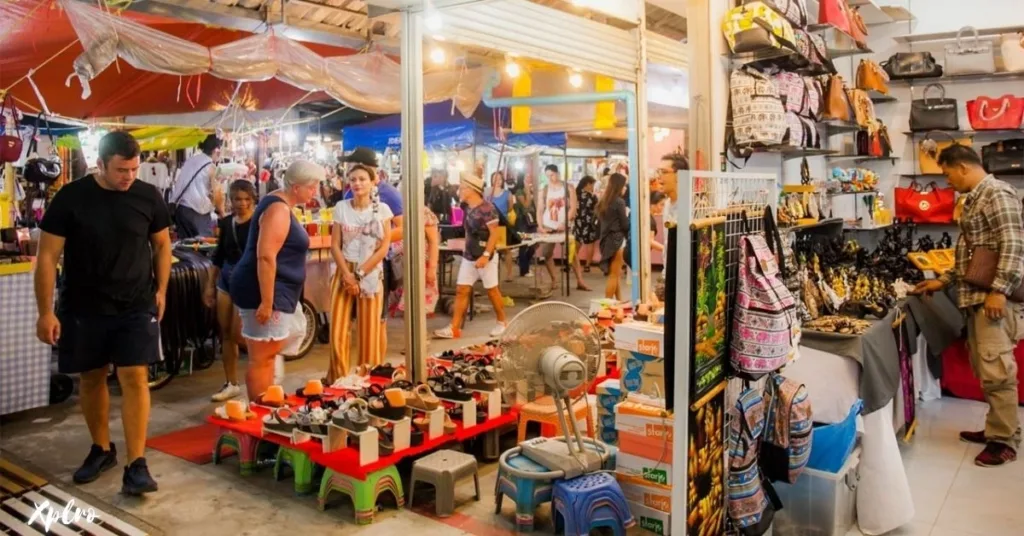What Not to Do in Thailand, the “Land of Smiles,” invites you with its stunning landscapes, rich culture, and warm hospitality. To ensure a respectful and enjoyable visit, understanding Thai customs and traditions is key. From mindful body language to respectful temple etiquette, this guide will help you navigate Thai culture gracefully. By avoiding certain behaviors, you can leave a positive impression and immerse yourself in the beauty of this enchanting country.
- 1. Avoid Disrespecting the Royal Family
- 2. Don’t Touch People’s Heads
- 3. Avoid Pointing with Your Feet
- 4. Don’t Disrespect Buddha Images
- 5. Avoid Public Displays of Affection
- 6. Don’t Raise Your Voice or Lose Your Temper
- 7. Avoid Touching Monks or Their Belongings
- 8. Don’t Refuse Offerings or Hospitality Rudely
- 9. Avoid Dressing Inappropriately
- 10. Don’t Step on the Threshold of a House or Temple
- 11. Avoid Being Too Informal with Elders
- 12. Don’t Bargain Aggressively
- FAQs
1. Avoid Disrespecting the Royal Family

The Thai royal family is deeply respected. It’s very important to avoid saying anything negative about the royal family, their pictures, or anything related to them. This is because it’s against the law in Thailand. Even a casual or unintentional comment can have serious consequences.
To show respect, always stand during the national anthem when it’s played in public places.
2. Don’t Touch People’s Heads
The head is considered the most sacred part of the body in Thai culture. Touching someone’s head, even playfully, is very disrespectful. This is especially true for children.
If you accidentally touch someone’s head, apologize immediately with a polite gesture.
3. Avoid Pointing with Your Feet
In Thai culture, feet are considered the lowest and least clean part of the body. Pointing at objects, people, or religious items with your feet is seen as disrespectful. Avoid stretching your legs towards others while sitting.
When sitting on the floor, fold your legs beneath you to avoid accidentally pointing your feet towards others.
4. Don’t Disrespect Buddha Images

Buddhism is deeply ingrained in Thai culture, and Buddha statues and images hold immense religious significance. Climbing on or posing inappropriately with these statues is highly disrespectful. When taking photos in temples, remember to maintain decorum. Always dress modestly, covering your shoulders and knees, and remove your shoes before entering.
5. Avoid Public Displays of Affection
While holding hands is generally acceptable, public displays of affection, like kissing or hugging, are considered inappropriate. Thais value modesty and politeness in social interactions. To respect local norms, save intimate gestures for private settings.
6. Don’t Raise Your Voice or Lose Your Temper
Thais value calmness and politeness, often referred to as “saving face.” Raising your voice or showing frustration in public is considered rude and embarrassing. Even in stressful situations, it’s important to maintain a calm and composed demeanor. If you encounter a problem, approach it calmly and politely. A smile can go a long way in resolving issues.
7. Avoid Touching Monks or Their Belongings
Monks hold a very special place in Thai society. Women should avoid any physical contact with monks, including handing them things directly. Men should also show respect by keeping a distance and not sitting higher than a monk.
If a woman needs to give something to a monk, she should place it on a cloth or table for the monk to pick up.
8. Don’t Refuse Offerings or Hospitality Rudely
Thais are known for their hospitality and often offer food, drinks, or assistance. Refusing their kindness without a polite gesture can be seen as rude. If you cannot accept, do so gracefully. Use a smile and the phrase “Mai ao khrap/ka” (No, thank you) to decline politely.
9. Avoid Dressing Inappropriately

Thailand is a relatively conservative country, especially when it comes to clothing, particularly in temples and rural areas. Beachwear is only appropriate at the beach; wearing it in towns or markets is considered disrespectful. It’s a good idea to carry a light scarf or sarong to cover up when visiting temples or religious sites.
10. Don’t Step on the Threshold of a House or Temple
In Thai tradition, thresholds are considered symbolic, and stepping on them is believed to bring bad luck or disrespect the spirits. Always step over them carefully when entering.
Always remove your shoes before entering someone’s home or a temple.
11. Avoid Being Too Informal with Elders
Respect for elders is a core value in Thai culture. Address older people with appropriate titles and avoid using casual or overly familiar language. Use the respectful term “Khun” before someone’s name when addressing them.
12. Don’t Bargain Aggressively

While bargaining is common in markets, it’s important to do it respectfully and with a smile. Aggressive or rude bargaining can offend vendors. Start with a friendly approach and remember that a small discount is often better than none.
Final Thoughts – What Not to Do in Thailand
To truly immerse yourself in the beauty of Thailand, understanding and respecting its customs is key. From showing reverence to the monarchy and Buddha statues to practicing mindful body language, these simple gestures can significantly enhance your travel experience. Remember to dress modestly, especially in temples, and avoid public displays of affection. A calm demeanor and polite communication go a long way in Thai society.
Respect for elders and local traditions are equally important. By being mindful of these cultural nuances, you’ll not only avoid any unintentional faux pas but also foster deeper connections with the locals. Embrace the warmth of Thai hospitality and create unforgettable memories in this enchanting land. For more in-depth cultural insights and travel tips, explore Xplro.com, your gateway to unforgettable Thai adventures.
FAQs
1. Is it appropriate to wear shorts in Thailand?
- While wearing shorts is fine in many tourist areas, it’s crucial to dress modestly, especially when visiting temples or royal grounds. For these sacred sites, ensure that your shoulders and knees are covered.
2. Can I take pictures inside temples in Thailand?
- Photographs are typically allowed outside temples, but there are restrictions inside certain areas. It’s important to be aware of signs or ask temple staff about the photography rules, especially near Buddha statues.
3. Is bargaining inappropriate in Thai markets?
- Bargaining is a common practice in Thailand’s markets, but it should always be done with respect. Never be aggressive or rude. Approach negotiations with a friendly and polite demeanor.
4. Is it okay to give gifts with my left hand in Thailand?
- In Thai culture, the left hand is considered impolite for giving and receiving gifts. To show respect, always use your right hand when presenting or accepting something from others, especially elders.
5. Are tattoos considered disrespectful in Thailand?
- In general, tattoos are not seen as offensive in Thailand, but it is recommended to avoid tattooing religious figures, especially Buddha, as this can be viewed as disrespectful by locals.
6. What should I avoid saying about Thailand’s royal family?
- The Thai royal family holds a position of great reverence, and criticizing or mocking the monarchy is illegal under the lèse-majesté law. It’s best to avoid any negative comments regarding the royal family.
7. Can I touch a monk in Thailand?
- Women are prohibited from touching monks, and men should maintain a respectful distance as well. If you need to give something to a monk, do so by placing it on a table or cloth for them to pick up.
8. Is it acceptable to show affection in public in Thailand?
- Public displays of affection such as kissing and hugging are generally discouraged in Thailand. While hand-holding is acceptable, it’s best to save more intimate gestures for private settings.
9. Should I tip when visiting Thailand?
- Tipping is not mandatory but is often appreciated. If service charges are not included, a 10% tip in restaurants is customary. Small tips are also welcomed by taxi drivers, hotel staff, and other service providers.
10. Is raising my voice in public considered acceptable in Thailand?
- Raising your voice or becoming visibly upset in public is frowned upon in Thai culture. Thais value calm and polite behavior. Always remain composed when dealing with disputes or inconveniences.
11. Is it offensive to touch someone’s head in Thailand?
- Yes, touching someone’s head, particularly children’s heads, is seen as disrespectful. In Thai culture, the head is considered sacred, so avoid this gesture to prevent offense.
12. Can I point with my feet in Thailand?
- Pointing with your feet is considered highly disrespectful in Thailand. Since feet are regarded as the lowest part of the body, be mindful not to point at people, religious objects, or anything of significance using your feet






